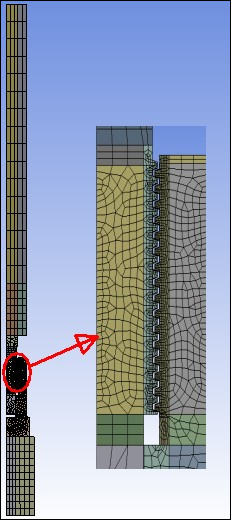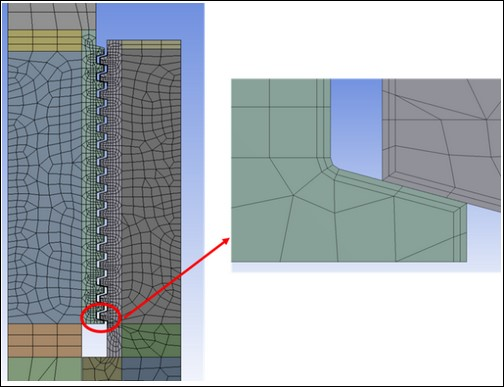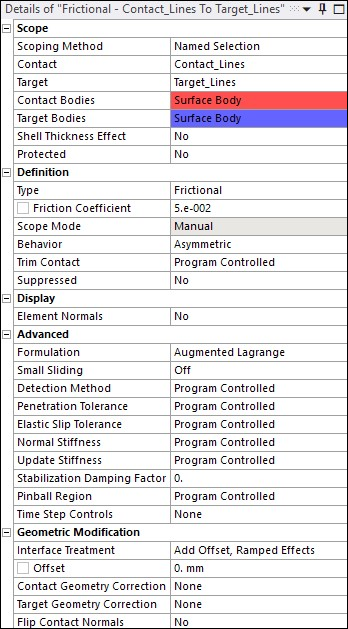The model uses PLANE182 2-D four-node structural solid elements with axisymmetric behavior (KEYOPT(3) = 1).
The mapped mesh for threads at critical locations are given an adequate mesh density.
The 2-D axisymmetric model of the threaded connection has two contact pairs:
The flexible-to-flexible contact pair uses a low value of friction (µ= 0.05). A very small amount of initial penetration (included in the contact analysis) exists between threads. You can change some properties of this contact pair (such as including/excluding the initial penetration or modifying the pinball region) during the 2-D to 3-D mapping process. On rare occasions, some experimentation may be necessary to determine the contact parameters to resolve convergence issues if they arise during solution mapping (MAP2DTO3D,SOLVE). The figure below shows details of contact settings used for this contact.
The rigid-to-flexible contact pair plays no role in the 2-D axisymmetric analysis. It is required for the 3-D model, however, when applying the bending load on the extruded 3-D model via a pilot node created for this contact pair. This is defined using the following command snippet as below since it is not supported in Workbench Mechanical.
finish /prep7 cmsel,s,Contact_Nodes esln esel,r,ename,,172 cm,Contact_Elements_New,element allsel,all cmsel,s,Total_Contact_Nodes esln esel,r,ename,,172 cm,New_Contact_Elements,element allsel,all *get,kpmax,kp,,num,max *get,ymax,node,0,mxloc,y nsel,s,loc,y,ymax *get,xmax,node,0,mxloc,x *get,xmin,node,0,mnloc,x k,kpmax+1,xmin,ymax k,kpmax+2,xmax,ymax l,kpmax+1,kpmax+2 *get,etmax,etyp,,num,max et,etmax+1,169 et,etmax+2,172 keyopt,etmax+1,2,1 keyopt,etmax+2,9,1 keyopt,etmax+2,12,5 nsel,s,loc,y,ymax cm,tn.cnt,node type,etmax+2 real,etmax+2 mat,etmax+2 esln esurf lsel,s,loc,y,ymax lplot type,etmax+1 lmesh,all allsel,all type,etmax+1 real,etmax+2 *get,nmax,node,,num,max pilotnode=nmax+1 n,nmax+1,0,ymax tshap,pilot e,nmax+1 allsel,all finish /solu
When the 2-D axisymmetric mesh is extruded to the 3-D mesh (EEXTRUDE), the program creates both contact pairs for the 3-D model.





